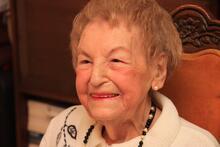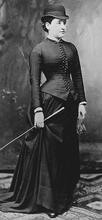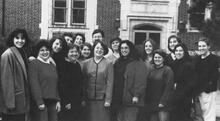Regina Jonas
Regina Jonas longed to become a rabbi for most of her life but struggled with the restrictions against women in higher education and rabbinical studies. Her 1930 thesis argued that there was no law forbidding women to become rabbis and that there were many biblical and historical examples of women teaching and arbitrating Jewish law. Despite her professors’ praise for her thesis, Jonas was only granted a teaching degree. She continued to lobby for ordination, which she achieved in 1935. She worked as a pastoral counselor at the Jewish Hospital in Berlin and preached at liberal synagogues as the deportations of rabbis began. Even after her deportation to Theresienstadt she continued to preach, teach, and inspire her fellow inmates until her final deportation to Auschwitz.
“If I confess what motivated me, a woman, to become a rabbi, two things come to mind. My belief in God’s calling and my love of humans. God planted in our heart skills and a vocation without asking about gender. Therefore, it is the duty of men and women alike to work and create according to the skills given by God.” Regina Jonas, C.-V.-Zeitung, June 23, 1938.
Regina Jonas, the first woman to be ordained as a rabbi, was killed in Auschwitz in October 1944. From 1942 to 1944 she performed rabbinical functions in Theresienstadt. She would probably have been completely forgotten had she not left traces both in Theresienstadt and in her native city, Berlin. None of her male colleagues, among them Rabbi Leo Baeck (1873–1956) and the psychoanalyst Viktor Frankl (1905–1997), ever mentioned her after the Shoah. In 1972, when Sally Priesand was ordained at Hebrew Union College in Cincinnati, she was referred to as the “first female rabbi ever”—misinformation that was never corrected by those who knew better. Only when the Berlin Wall came down and the archives in East Germany became accessible was Regina Jonas’s legacy found in the Gesamtarchiv der deutschen Juden (General Archive of German Jews).
Early Life
Regina Jonas was born in Berlin on August 3, 1902, the daughter of Wolf and Sara Jonas. She grew up in the Scheunenviertel, a poor, mostly Jewish, neighborhood. Her father, a merchant who died of tuberculosis in 1913, was probably her first teacher. Early on, Regina Jonas felt her rabbinic vocation. Her passion for Jewish history, Bible, and Hebrew was apparent even in high school, where fellow pupils recall her talking about becoming a rabbi.
Many people supported Jonas’s interests, among them the Orthodox rabbis Isidor Bleichrode, Felix Singermann, and Max Weyl, the last of whom was known for his open attitude regarding religious education for girls. Max Weyl often officiated in the Rykestrasse Synagogue, which Sara Jonas and her two children, Abraham and Regina, regularly attended. Until his deportation to Theresienstadt, Weyl and Jonas met once a week in order to study rabbinic literature— Lit. "teaching," "study," or "learning." A compilation of the commentary and discussions of the amora'im on the Mishnah. When not specified, "Talmud" refers to the Babylonian Talmud.Talmud, Lit. "the prepared table." A code of Jewish Law compiled by Joseph Caro (1488Shulhan Arukh, and texts. In 1923, Jonas passed her Abitur (final exam of secondary school) at the Oberlyzeum Weissensee. The following year, she attended a teachers’ seminar, enabling her to teach Jewish religion in girls’ schools in Berlin.
In 1924, Jonas matriculated at the Hochschule für die Wissenschaft des Judentums, founded in Berlin in 1872. This liberal institution admitted women as students, as did the Jüdisch-Theologisches Seminar in Breslau, founded in 1854, but Jonas was the only woman who hoped to be ordained as a rabbi. All her fellow women students were studying for an academic teacher’s degree.
Graduate Thesis
Eduard Baneth (1855–1930), professor of Talmud at the Hochschule and responsible for rabbinic ordination, was the supervisor of Jonas’s final thesis, which dealt with the topic “May a woman hold rabbinic office?” A copy of this document has been preserved and can be found at the Centrum Judaicum in Berlin. Submitted in June 1930, this paper is the first known attempt to find a The legal corpus of Jewish laws and observances as prescribed in the Torah and interpreted by rabbinic authorities, beginning with those of the Mishnah and Talmud.halakhic basis for the ordination of women.
In her thesis, Jonas combines a halakhic line of argument with a modern attitude. She did not follow the Reform movement, which was willing to achieve modernization by abandoning halakhah. Rather, she wanted to deduce gender equality from the Jewish legal sources: the female rabbinate should be understood as a continuity of tradition. This proves Jonas’s independence both from Orthodoxy, which held equality as incompatible with halakhah, and from Reform, which saw itself as the sole advocate of female emancipatory interests.
On the opening page of her thesis, Jonas writes: “I personally love this profession and, if ever possible, I also want to practice it.” On the last page she concludes: “Almost nothing halakhically but prejudice and lack of familiarity stand against women holding rabbinic office.”
Since rabbinic literature did not deal with ordination per se, Jonas embraces the halakhic literature that relates more generally to women’s issues. She names important women who, though not holding the title “rabbi,” fulfilled rabbinical functions, most specifically as decisors of halakha. In addition to biblical protagonists, she mentions Talmudic personalities such as Beruryah, Yalta, the Hasmonean queen Salome Alexandra, and also Rashi’s daughters and granddaughters, who were involved in halakhic decision making. She quotes negative Talmudic statements about women, not only countering them with positive statements, but also contextualizing them by quoting equally negative statements about great sages.
Jonas distinguishes between immutable statutes of divine origin on the one hand and “opinions” of individual rabbis on the other. For her, the validity of a prohibition depends on the reasoning behind it, not on the prohibition as such.
A key issue in her argument is the ideal of Zeni’ut —(Modesty). She expects women in particular to re-establish values such as humility, restraint, and morality. In her opinion, a female rabbi should not marry—but every woman should be free to decide if she wants a life as wife and mother or a profession according to her skills. In Jonas’s opinion, women are especially fit to be rabbis, since “female qualities” such as compassion, social skills, psychological intuition, and accessibility to the young are essential prerequisites for the rabbinate. Therefore, she argues, female rabbis are “a cultural necessity.”
Jonas’s thesis received a grade of “good” (Praedikat gut). Soon thereafter, Eduard Baneth died and his successor, Hanokh Albeck (1890–1972), proved unwilling to ordain a woman. None of the other professors of the Hochschule raised their voices on this issue, probably fearing a scandal. As a result, Regina Jonas graduated only as religious teacher. In the following years, she taught religion at several girls’ schools in Berlin, where she was known to be a very popular and committed teacher.
Career
In 1933, the workload for Jewish teachers increased tremendously, since the students who had to leave public schools due to antisemitism not only needed Jewish knowledge, but also needed to learn to be proud of their Jewish heritage.
Nevertheless, Jonas continued to pursue ordination. Finally, in 1935, Rabbi Max Dienemann (1875–1939), executive director of the Liberaler Rabbinerverband (Conference of Liberal Rabbis) agreed to the ordination, on behalf of the Verband. Her diploma of ordination reads: “Since I saw that her heart is with God and Israel, and that she dedicates her soul to her goal, and that she fears God, and that she passed the examination in matters of religious law, I herewith certify that she is qualified to answer questions of religious law and entitled to hold the rabbinic office. And may God protect her and guide her on all her ways.”
Only a few years of rabbinic work in Berlin were granted to Regina Jonas. In 1937, the Berlin Jewish Gemeinde (official community) began to employ her officially as “pastoral-rabbinic counselor” in its welfare institutions. Thereafter she officiated regularly at the Jewish Hospital. Since more and more rabbis were imprisoned or had emigrated, she also started to preach in the more liberal synagogues in Berlin. A group of regulars from the famous Neue Synagoge, the flagship of German Jewry, had her preach at Lit. "distinction, division." The blessing recited at the close of the Sabbath and Festivals to indicate the distinction between holy and ordinary days.havdalah services in the “weekday” synagogue. Jonas lectured to groups of WIZO and the Jüdischer Frauenbund, as well as to sisterhoods of the Jewish lodges.
She herself put a strong emphasis on her pastoral work, visiting the sick in the Jewish Hospital and caring for those elderly whose economic situation became desperate after the pogrom of November 9 and 10, 1938 (“Kristallnacht”). Among her papers, there are many letters from abroad in which refugees thank her for taking care of their parents who had remained in Germany.
Life in the Holocaust
In the winter of 1940–1941, the Reichsvereinigung der Juden in Deutschland (the compulsory umbrella organization of German Jewry established by the Nazis in 1939) sent Jonas to several cities where the Jewish Gemeinde remained without rabbis. She gave sermons in Braunschweig, Göttingen, Frankfurt am Oder, Wolfenbüttel, and Bremen.
In 1941, when most of those who had so far escaped deportation had to do forced labor and were therefore unable to attend regular services, the congregation instituted special services. Jonas, who was herself forced to work in a factory, led many of these. Survivors report that her sermons and her pastoral work were especially uplifting and encouraging.
On November 6, 1942, Regina Jonas and her mother were deported to Theresienstadt. Even there she worked as rabbi, preaching and counselling. She was officially part of the Referat für psychische Hygiene, which was led by the psychoanalyst Viktor Frankl.
On October 12, 1944, she and her mother were deported to Auschwitz and probably killed the same day. In the archives of Terezín there remains a handwritten document that summarizes her religious worldview and her legacy. Under the title “Lectures by the only female rabbi Regina Jonas,” it lists twenty-four topics for lectures, followed by notes on a sermon which she delivered in Terezin. Here she summarizes her religious outlook and testament:
“Our Jewish people was planted by God into history as a blessed nation. ‘Blessed by God’ means to offer blessings, lovingkindness and loyalty, regardless of place and situation. Humility before God, selfless love for His creatures, sustain the world. It is Israel’s task to build these pillars of the world— man and woman, woman and man alike have taken this upon themselves in Jewish loyalty. Our work in Theresienstadt, serious and full of trials as it is, also serves this end: to be God’s servants and as such to move from earthly spheres to eternal ones. May all our work be a blessing for Israel’s future (and the future of humanity) … Upright ‘Jewish men’ and ‘brave, noble women’ were always the sustainers of our people. May we be found worthy by God to be numbered in the circle of these women and men … The reward of a A biblical or rabbinic commandment; also, a good deed.mitzvah is the recognition of the great deed by God. Rabbi Regina Jonas, formerly of Berlin.”
In 2014, a plaque was unveiled at Theresienstadt commemorating Jonas’ life and legacy.
Klapheck, Elisa, ed. Fräulein Rabbiner Jonas—The Story of the First Woman Rabbi. San Francisco: 2004. (Fräulein Rabbiner Jonas—Kann die Frau das rabbinische Amt bekleiden? Teetz: 2000).
Herweg, Rachel Monika. “Regina Jonas (1902–1944).” In Meinetwegen ist die Welt erschaffen. Das intellektuelle Vermächtnis des deutschsprachigen Judentums. 58 Porträts, edited by Hans Erler, Ernst Ludwig Ehrlich, and Ludger Heid. Frankfurt, New York: 1997.
Kellenbach, Katharina von. “God Does Not Oppress Any Human Being: The Life and Thought of Rabbi Regina Jonas.” In Leo Baeck Institute: Yearbook XXXIX (1994).
Kellenbach, Katharina von. “Forgotten Voices: German Women’s Ordination and the Holocaust.” In Proceedings of the Second Biennial Conference on Christianity and the Holocaust, Rider College II (1992).
Moore, Deborah Dash. “Saving Regina Jonas.” Frankely Speaking, Jean & Samuel Frankel Center for Judaic Studies (December 2014): 2.
Moore writes about the significance of Regina Jonas to modern Jewish rabbinical life in light of her trip to European sites that were a part of Jonas' life.
Reimer, Gail and Julie Mallozzi, dir. In the Footsteps of Regina Jonas. 2014.
Sarah, Elizabeth. "The Discovery of Fräulein Rabbiner Regina Jonas: Making Sense of Our Inheritance." European Judaism: A Journal for the New Europe 28, no. 2 (1995): 91-98.
Silverman, Emily Leah. Edith Stein and Regina Jonas: Religious visionaries in the time of the Death Camps. Routledge, 2014.
Sinclair, Stefanie. "Regina Jonas: forgetting and remembering the first female rabbi." Religion 43, no. 4 (2013): 541-563.
Sinclair, Stefanie. "Memory and identity: Female leadership and the legacy of Rabbi Regina Jonas." (2019).
von Kellenbach, Katharina. “Preaching Hope: Denial and Defiance of Genocidal Reality in Rabbi Regina Jonas’ Work.” In Ram's horn blown during the month before and the two days of Rosh Ha-Shanah, and at the conclusion of Yom Kippur. shofar (1998).
von Kellenbach, Katharina. "“God Does Not Oppress Any Human Being” The Life and Thought of Rabbi Regina Jonas." The Leo Baeck Institute Year Book 39, no. 1 (1994): 213-225.












